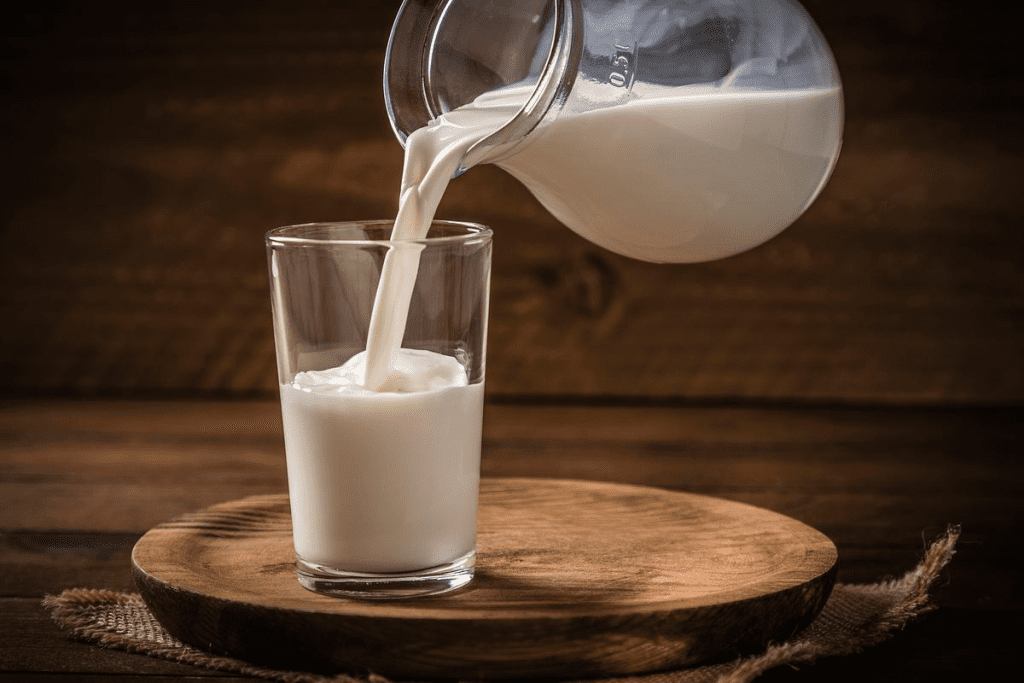New studies show that dairy might mess with your sleep, mainly for those with lactose intolerance. They found a link between dairy and bad sleep, including nightmares, and even connections between allergies and sleep apnea that can further disrupt restful sleep.

We’re looking into how dairy affects your sleep. It’s all about lactose intolerance and its impact on sleep quality. Studies show that those who can’t digest lactose well sleep poorly and have nightmares more often.
Key Takeaways
- Dairy consumption may contribute to sleep disturbances.
- Lactose intolerance can increase the risk of nightmares.
- Individuals with lactose intolerance are more likely to experience poor sleep.
- Reducing dairy intake may help alleviate sleep problems.
- Further research is needed to understand the link between dairy and sleep.
The Relationship Between Dairy and Sleep Quality
Research shows that dairy can both help and hurt sleep quality. The link between dairy and sleep issues is complex. Many factors play a role.

What Research Reveals About Dairy Consumption Before Bed
Studies have looked into how dairy affects sleep. Some say it can improve sleep, while others claim it can mess with sleep patterns. For example, a study found that about one-third of people had nightmares often. Those with lactose intolerance were more likely to have poor sleep.
Recent studies have shed light on how dairy impacts sleep. Some say the tryptophan in dairy helps make serotonin, which helps you relax and sleep. However, others note that lactose intolerance or dairy allergies can cause sleep problems.
Common Sleep Disturbances Associated with Dairy Products
Dairy has been linked to sleep issues like insomnia and restless sleep. People with lactose intolerance or dairy allergies are more likely to face these problems. The discomfort and digestive issues from dairy can make it hard to fall or stay asleep.
Also, allergies and sleeplessness are closely tied. Allergic reactions to dairy can cause breathing problems like congestion and coughing. These can mess with your sleep patterns. Knowing the sleep issues linked to dairy is key to better sleep.
By understanding the sleep problems dairy can cause, people can make better choices about their diet and sleep. We suggest trying different dairy products or changing when you eat them to avoid sleep issues.
Understanding Lactose Intolerance and Sleep Disruption
Lactose intolerance affects how we digest food, which can mess with our sleep. It’s a condition where our body can’t break down lactose, a sugar in milk. This problem bothers millions and can make it hard to sleep well.

How Lactose Intolerance Affects the Digestive System
Lactose intolerance makes it hard for our body to digest lactose. This sugar is in milk and dairy. Without proper digestion, it turns into gas, causing bloating, gas, diarrhea, and stomach pain. These symptoms can really mess with our sleep.
The Connection Between Digestive Discomfort and Sleep Quality
When we can’t digest lactose, it affects our sleep. Bloating and stomach pain make it hard to fall or stay asleep. It also adds to stress and anxiety, making sleep even worse. It’s key to manage these symptoms to sleep better.
2025 Canadian University Study Findings
A 2025 study by a Canadian university found a strong link between lactose intolerance and sleep problems. Over 1,000 students were studied, and those with lactose intolerance had worse sleep and nightmares. This shows how important diet is for good sleep.
In short, lactose intolerance can really mess with our sleep because of the discomfort it causes. Making changes to our diet can help improve sleep. Knowing how our digestive health affects sleep can help us feel better overall.
Dairy Products Most Likely to Affect Sleep
Knowing which dairy products can mess with sleep is key for those who can’t sleep well. Research shows some dairy items might upset sleep, mainly for those with lactose intolerance or dairy allergies.
People with lactose intolerance might feel uncomfortable if they eat high-lactose dairy before bed. High-lactose dairy products like milk, cheese, and ice cream are common and can cause issues.
High-Lactose Dairy Products to Avoid Before Bedtime
To avoid sleep problems, it’s smart to cut down or skip high-lactose dairy close to bedtime. Some high-lactose items include:
- Milk
- Soft cheeses like ricotta and cottage cheese
- Ice cream
- Yogurt with high lactose content
Staying away from these before bed can help avoid sleep issues linked to lactose intolerance. For those with allergy and insomnia, watching what they eat is very important.
Lower-Impact Alternatives for Better Sleep
If you like dairy but it messes with your sleep, there are gentler options. Lactose-free or low-lactose dairy products are better for those who are lactose sensitive. Some examples are:
- Lactose-free milk
- Hard cheeses, which generally have lower lactose levels
- Lactose-free yogurt
Choosing these alternatives lets you enjoy dairy without worrying about sleep problems. It’s also good to think about when you eat dairy and how it affects your sleep. For those wondering allergies can affect sleep, yes, and watching your dairy intake can help improve sleep.
The Link Between Allergies and Sleep Apnea
Dairy allergies can lead to sleep apnea in some people. Unlike lactose intolerance, dairy allergies cause an immune reaction to milk proteins. This can make symptoms worse and affect sleep quality.
How Dairy Allergies Differ from Lactose Intolerance
Dairy allergies and lactose intolerance are not the same. Lactose intolerance is when you can’t digest lactose in milk. A dairy allergy is an immune reaction to milk proteins. Symptoms can range from mild to severe, including hives and stomach cramps.
Knowing the difference is key. For those with dairy allergies, avoiding dairy is not just a choice. It’s necessary to avoid serious reactions.
The Impact of Allergic Reactions on Breathing During Sleep
Allergic reactions to dairy can cause airway inflammation. This can lead to breathing problems during sleep. Consuming dairy before bed can trigger reactions like nasal congestion and throat swelling.
Sleep apnea is a serious condition where breathing stops during sleep. Dairy allergies can make this worse by blocking the airway more.
Recognizing Symptoms of Dairy-Related Sleep Apnea
Identifying dairy-related sleep apnea requires knowing the symptoms. Look out for loud snoring, stopped breathing during sleep, and waking up with a dry mouth. Other allergy symptoms, like skin rashes and digestive issue,s are also important.
If dairy is affecting your sleep, see a doctor. They can figure out if it’s a dairy allergy or something else. They’ll help you manage symptoms and improve your sleep.
Nightmares and Dairy: Examining the Evidence
There’s growing evidence that dairy products might be linked to more nightmares. It’s key to know why this happens.
The Science Behind Food-Induced Nightmares
Some foods can change how we sleep and dream. Dairy, in particular, might cause nightmares. The proteins and sugars in dairy can mess with our brain chemicals, making dreams more vivid or scary.
For those with lactose intolerance, it’s worse. The discomfort can mess with sleep, leading to more intense dreams or nightmares.
Statistical Correlation Between Dairy Consumption and Nightmare Frequency
A 2025 study found a strong link between dairy and nightmares in those with lactose intolerance. It shows how important diet is for good sleep.
The study found that eating dairy before bed made nightmares worse. This was true for those with lactose intolerance, showing that not being able to digest lactose well can worsen sleep issues.
Why Lactose-Intolerant Individuals Experience More Intense Dreams
Lactose intolerance can cause stomach problems like bloating and pain. These issues can mess with sleep, leading to more stress and anxiety. This stress can make dreams more intense or scary.
The body’s reaction to lactose intolerance can also change how we dream. It’s important for those with frequent nightmares to think about what they eat. They might need to avoid dairy.
In short, dairy, and nightmares are linked, more so for those with lactose intolerance. Knowing this can help us improve our sleep and dreams.
Practical Tips for Better Sleep When Sensitive to Dairy
For those who are sensitive to dairy, getting a good night’s sleep is key. We know that dairy can mess with your sleep. Luckily, there are ways to make it better.
Timing Your Dairy Consumption
When you eat dairy is important. Eating it too close to bedtime can make you uncomfortable and keep you awake. Try to stop eating dairy at least 2-3 hours before bed to digest it properly.
Also, think about what dairy you’re eating. High-lactose foods like milk and ice cream might bother you more than low-lactose or lactose-free ones.
Dietary Adjustments to Improve Sleep Quality
Changing what you eat is key to better sleep if you’re sensitive to dairy. Try dairy alternatives like almond milk, soy milk, or coconut milk. They might help you sleep better.
Keeping a food diary can also help. It lets you see which dairy foods might be causing sleep problems. This way, you can choose better foods for your diet.
- Choose low-lactose or lactose-free dairy products.
- Explore dairy alternatives like almond milk or soy milk.
- Keep a food diary to track sleep disturbances.
When to Consult a Healthcare Professional
If you’re not sleeping well even after changing your diet, see a doctor. They can give you advice tailored to you. They’ll figure out if dairy is the problem or something else.
It’s really important to get help if you keep having trouble sleeping. If you think dairy might be causing allergy and insomnia or sleep apnea, see a doctor right away.
By making smart choices about dairy and getting help when you need it, you can sleep better. This is good for your overall health and happiness.
Conclusion
Understanding how dairy affects sleep is key to better rest. Studies show that how well you tolerate dairy can impact your sleep. For those who are sensitive, dairy allergies might lead to trouble sleeping.
This connection between allergies and sleep is getting more attention. It seems that dairy allergies can mess with your sleep patterns. Knowing this can help you make better choices for your diet and sleep.
By choosing dairy-free options and being careful when you eat dairy, you can improve your sleep. It’s important to find what works best for you. This way, you can get the restful sleep you need.
FAQ
Can dairy consumption cause sleep problems?
Yes, dairy can lead to sleep issues, mainly for those with lactose intolerance. Studies show it can result in poor sleep and nightmares.
How does lactose intolerance affect sleep quality?
Lactose intolerance can make sleep tough due to digestive issues. People with it might face sleep problems from discomfort, bloating, and more.
What dairy products are most likely to affect sleep?
Products like milk and ice cream, high in lactose, can disrupt sleep for those with intolerance. Options like lactose-free milk or hard cheeses might be better.
Can allergies cause sleeplessness or insomnia?
Yes, allergies can lead to trouble sleeping. They cause discomfort, congestion, and other issues that can mess with sleep. Dairy allergies, in particular, can lead to sleep apnea and breathing problems at night.
What is the link between dairy allergies and sleep apnea?
Dairy allergies can affect breathing at night, leading to sleep apnea. Symptoms like congestion, coughing, or breathing trouble can occur during sleep.
Can dairy consumption cause nightmares?
Yes, dairy can be linked to more nightmares, mainly in those with lactose intolerance. The exact reasons are unclear, but digestive issues might play a part.
How can I promote better sleep if I’m sensitive to dairy?
To sleep better, avoid high-lactose dairy before bed and opt for lower-lactose options. Making dietary changes can help. Getting advice from a healthcare professional is also wise.
When should I consult a healthcare professional about dairy-related sleep problems?
If dairy causes ongoing sleep issues or discomfort, see a healthcare professional. They can find the cause and help manage symptoms.
References
- St-Onge, M. P. (2023). Exploring the role of dairy products in sleep quality. Nutrients, 15(3), Article 543.





